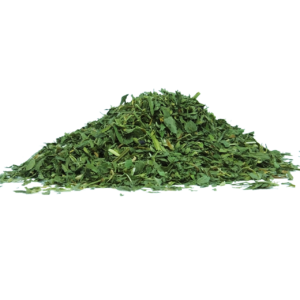What is the Role Potassium Plays in an Alfalfa Plant?
When growing alfalfa, potassium is crucial. This essential nutrient plays a key role in plant growth and development, ensuring your crop is strong and healthy. Alfalfa plants need more potassium than any other nutrient, making it vital for any fertilizer program.
Potassium helps with water regulation, enzyme activation, and photosynthesis. Ensuring adequate potassium levels boosts the overall health and productivity of your alfalfa crop.
Regular soil testing is essential to determine potassium levels. Based on the results, select the right potassium-rich fertilizers. Proper fertilization supports healthy growth and enhances resistance to diseases and stress.
In summary, managing potassium levels is essential for successful alfalfa cultivation. Prioritizing this nutrient ensures robust plant growth and maximizes crop yields.
1. Introduction to the Role of Nutrients in Plant Growth
Plants, like humans, need essential nutrients to thrive. Among these, potassium is a powerhouse for promoting healthy plant growth. As one of the essential macronutrients, potassium is vital for various physiological processes, especially in alfalfa.
Nutrients are the building blocks of plant development, enabling functions like photosynthesis, respiration, and nutrient uptake. They are divided into macronutrients, needed in larger quantities, and micronutrients, required in smaller amounts. Macronutrients include potassium, nitrogen, and phosphorus, while micronutrients include iron, zinc, and manganese.
Potassium, symbolized by K, is crucial in plant metabolic processes. It activates enzymes, synthesizes proteins, and regulates stomatal function. In alfalfa, potassium is even more significant due to its specific growth needs.
Alfalfa, a nutrient-rich legume, thrives in potassium-rich soils. This nutrient helps the plant withstand environmental stress, boosts root development, and improves overall vigor. Adequate potassium levels also enhance water and nutrient uptake efficiency, leading to higher yields and better forage quality.
Potassium also aids in synthesizing and translocating sugars within the plant, promoting carbohydrate production necessary for growth and energy storage. It strengthens disease resistance, helping alfalfa fend off pathogens and pests.
Understanding potassium’s role in plant growth is crucial for farmers, agronomists, and anyone involved in alfalfa production. Ensuring optimal potassium levels in the soil unlocks the true potential of alfalfa crops, leading to improved yield, quality, and resilience.
In the following sections, we will explore how potassium influences alfalfa growth, focusing on root development, water uptake, carbohydrate metabolism, and disease resistance. Stay tuned to discover the secrets to maximizing your alfalfa crop’s success through the power of potassium.
2. Understanding the Importance of Potassium for Plant Health
Potassium, often referred to as the “forgotten nutrient,” plays a crucial role in the growth and development of alfalfa plants. While nitrogen and phosphorus often get more attention, the importance of potassium in supporting plant health cannot be overstated.
Potassium is involved in many physiological processes within alfalfa plants. One of its key functions is osmoregulation, which helps regulate water movement and maintain proper cellular pressure. This is especially important for alfalfa, a deep-rooted perennial crop that needs efficient water uptake and transport to thrive.
Additionally, potassium activates numerous enzymes involved in photosynthesis, respiration, and protein synthesis. It aids in converting light energy into chemical energy, enabling the efficient production of sugars and carbohydrates that fuel plant growth. Potassium also helps synthesize important plant proteins, ensuring proper tissue development and overall plant vigor.
Potassium also enhances the stress tolerance of alfalfa plants. It regulates stomatal opening and closing, which allows for better control of water loss through transpiration. This helps alfalfa cope with drought conditions, ensuring survival during water scarcity.
Moreover, potassium plays a crucial role in nutrient uptake and transport within the plant. It enhances the efficiency of nutrient absorption, especially for essential elements like nitrogen, phosphorus, and magnesium. This uptake synergy ensures balanced nutrition and optimal resource utilization, promoting healthy and robust alfalfa growth.
In conclusion, potassium is an often overlooked but essential nutrient for alfalfa plant health. Its roles in osmoregulation, enzyme activation, protein synthesis, stress tolerance, and nutrient uptake highlight its importance in supporting alfalfa growth and development. By understanding and prioritizing potassium, farmers and gardeners can unlock the full potential of their alfalfa crops and reap the benefits of improved yield and quality.
3. The Specific Role of Potassium in Alfalfa Plant Growth
Potassium, an essential nutrient for plant growth, plays a crucial role in the development of alfalfa plants. As one of the three primary macronutrients, along with nitrogen and phosphorus, potassium impacts various physiological processes that directly affect alfalfa’s growth and health.
One key function of potassium in alfalfa is regulating water movement and improving water-use efficiency. Alfalfa plants with adequate potassium can maintain proper water balance, especially during drought or water stress. This is vital for alfalfa, a deep-rooted plant that needs ample water to thrive.
Additionally, potassium enhances the overall quality of alfalfa forage. It improves the plant’s resistance to diseases and pests, making it more resilient against common threats that can reduce yield and quality. Potassium also helps synthesize and transport carbohydrates, proteins, and other essential compounds within the plant, ultimately influencing its nutritional value.
Furthermore, potassium influences the structural integrity of alfalfa plants by promoting cell wall strength and development. This helps the plants withstand harsh environmental conditions, such as strong winds or heavy rain, reducing the risk of lodging and damage. Potassium also aids in root development, enabling alfalfa plants to establish a strong and extensive root system, enhancing nutrient uptake and overall growth.
To ensure optimal alfalfa growth, it is crucial to provide a balanced supply of potassium throughout the growing season. Soil testing can help determine potassium levels and guide appropriate fertilization strategies. By understanding the specific role of potassium in alfalfa growth, farmers and growers can optimize their management practices, leading to healthier, more productive crops.
4. Signs of Potassium Deficiency in Alfalfa Plants
Potassium deficiency can significantly impact the growth and health of alfalfa plants. Recognizing the signs of potassium deficiency is crucial for farmers and gardeners aiming to maximize the yield and quality of their alfalfa crops.
One of the first signs of potassium deficiency in alfalfa is yellow or pale green leaves. This discoloration typically starts at the edges and gradually spreads inward, giving the plant a sickly appearance. The leaves may also exhibit a scorched or burned look, with brown or yellow necrotic spots.
Another noticeable symptom is stunted growth. Potassium-deficient alfalfa plants often have reduced shoot and root development, leading to smaller plants with less vigor. The overall size and height of the plants may be noticeably smaller compared to healthy ones.
Potassium-deficient alfalfa also displays weak stems that are more prone to lodging or breaking under the weight of the leaves. This structural weakness makes the plants more susceptible to damage from wind or heavy rain.
Additionally, potassium deficiency can adversely affect flowering and seed production. The number and size of flowers may decrease, leading to reduced seed set and lower yields. This deficiency also impacts the nutritional value of the harvested forage, as potassium is crucial for protein synthesis and overall plant metabolism.
By closely monitoring alfalfa plants for these signs of potassium deficiency, farmers and gardeners can take proactive measures to address the issue. Applying potassium-rich fertilizers or organic amendments can help replenish nutrient levels in the soil and promote healthy plant growth. Regular soil testing and maintaining proper nutrient balance are essential for ensuring the optimal health and productivity of alfalfa crops.
5. The Impact of Potassium on Root Development and Nutrient Uptake
Potassium, often called the “silent hero” of plant nutrients, plays a crucial role in the growth and development of alfalfa plants. One of its key impacts is on root development and nutrient uptake, which ultimately influences the overall health and productivity of the plants.
When potassium is present in adequate amounts, it promotes strong and vigorous root growth. The roots of alfalfa plants serve as the foundation, anchoring them firmly in the ground and ensuring stability. Additionally, a well-developed root system enables plants to access water and essential nutrients more efficiently.
Moreover, potassium facilitates nutrient uptake in alfalfa plants. It acts as a catalyst, improving the plant’s ability to absorb and transport other essential nutrients like nitrogen and phosphorus. This nutrient synergy is crucial for optimal plant growth and development, ensuring that all required elements are available for various physiological processes.
Furthermore, potassium aids in the regulation of stomatal openings, which are tiny pores on the leaves’ surface. By controlling these stomata, potassium helps regulate water loss through transpiration. This maintains proper hydration levels in the plant and reduces the risk of drought stress.
In alfalfa plants, a balanced supply of potassium is essential for maximizing root development and nutrient uptake. Monitoring potassium levels in the soil and providing appropriate supplementation if necessary is recommended. By doing so, farmers and gardeners can unlock the full potential of their alfalfa crops, leading to healthier plants, increased yields, and improved overall quality.
6. How Potassium Affects Photosynthesis and Overall Plant Productivity
Potassium, often called the “miracle mineral” for plants, is crucial for photosynthesis and overall productivity in alfalfa plants. As an essential macronutrient, potassium supports various physiological functions, including regulating stomatal openings and activating enzymes.
Photosynthesis, the process where plants convert sunlight into energy, heavily depends on potassium. This mineral acts as a catalyst in enzymatic reactions, facilitating the conversion of carbon dioxide and water into glucose and oxygen. By boosting these enzymes, potassium helps plants efficiently capture and use sunlight, increasing energy production.
Potassium also regulates stomatal openings, tiny pores on leaf surfaces responsible for gas exchange. By maintaining osmotic balance in guard cells, potassium influences stomatal function, controlling water loss and enabling carbon dioxide uptake for photosynthesis. This regulation optimizes photosynthesis efficiency and conserves water.
Beyond photosynthesis, potassium boosts overall plant productivity. Adequate potassium levels promote root development, nutrient uptake, and carbohydrate metabolism. It supports protein and enzyme synthesis necessary for growth and pest resistance, enhancing alfalfa plant health, yield, and quality.
To leverage potassium’s benefits in alfalfa growth, maintaining proper soil potassium levels is crucial. Regular soil testing provides insights into potassium content and guides supplementation if needed. Balanced fertilization with potassium-rich fertilizers or organic amendments ensures plants access this essential mineral.
In conclusion, potassium is vital for photosynthesis and alfalfa productivity. Its role in enzymatic reactions, stomatal regulation, and nutrient uptake makes it indispensable for plant growth. By understanding and utilizing potassium effectively, farmers can maximize alfalfa crop potential, leading to better yields and sustainability.
7. Potassium’s Role in Disease Resistance and Stress Tolerance
Potassium, often overlooked in plant growth discussions, is crucial for disease resistance and stress tolerance in alfalfa plants. This essential nutrient promotes overall plant health and strengthens natural defenses, making alfalfa more resilient to environmental challenges.
One key function of potassium in disease resistance is regulating stomatal function. Stomata are tiny pores on leaves that facilitate gas exchange and water release. By maintaining proper stomatal function, potassium creates a less favorable environment for pathogens. Additionally, potassium enhances the synthesis of proteins and enzymes involved in plant defense, further fortifying the plant against diseases.
Potassium also plays a vital role in stress tolerance, helping alfalfa withstand drought, high temperatures, and salinity. During stress, potassium regulates water uptake and retention in plant cells, preventing excessive water loss and maintaining optimal turgor pressure. This keeps the plant hydrated and allows it to continue essential physiological processes even under challenging conditions.
Moreover, potassium activates enzymes involved in stress response pathways. These enzymes help produce protective compounds like osmolytes and antioxidants, which alleviate cellular damage caused by stress. By boosting stress tolerance, potassium enables alfalfa plants to survive and thrive in harsh environments, ensuring longevity and productivity.
To harness potassium for disease resistance and stress tolerance in alfalfa, maintaining an appropriate nutrient balance in the soil is crucial. Regular soil testing and proper fertilization ensure that alfalfa crops receive adequate potassium levels. By providing necessary potassium, farmers can significantly enhance disease resistance and stress tolerance, leading to healthier and more productive alfalfa crops.
In conclusion, potassium’s role in disease resistance and stress tolerance is vital for alfalfa growth. Understanding and leveraging this essential nutrient helps farmers bolster the health and resilience of their crops, leading to improved yields and sustainable agricultural practices.
8. The Optimal Potassium Levels for Alfalfa Plants
When it comes to the growth and development of alfalfa plants, potassium plays a crucial role. As a macronutrient, potassium is essential for various physiological processes within the plant, including photosynthesis, water regulation, enzyme activation, and protein synthesis.
Determining the optimal potassium levels for alfalfa plants is key to maximizing their growth potential and productivity. Adequate potassium levels ensure that the plants can efficiently uptake and utilize other vital nutrients, such as nitrogen and phosphorus.
Research shows that alfalfa plants thrive best when the soil contains potassium levels ranging from 150 to 250 pounds per acre. However, specific potassium requirements may vary based on factors such as soil type, climate, and overall plant health.
Maintaining optimal potassium levels in the soil can be achieved through methods like soil testing and fertilization. Regular soil testing allows farmers and gardeners to assess the potassium content in the soil and make informed fertilizer application decisions.
Additionally, incorporating potassium-rich organic matter, such as compost or manure, can help replenish potassium levels in the soil naturally. This promotes sustainable and environmentally friendly agriculture practices while ensuring the long-term health and productivity of alfalfa plants.
By understanding and managing the optimal potassium levels, farmers and gardeners can ensure that their alfalfa plants receive the necessary nutrients for robust growth, increased yield, and overall plant health. The power of potassium should not be underestimated when it comes to unleashing the full potential of alfalfa crops.
9. Best Practices for Applying Potassium Fertilizers to Alfalfa Crops
When it comes to maximizing the growth and yield of alfalfa crops, applying potassium fertilizers correctly is crucial. Potassium plays a vital role in photosynthesis, protein synthesis, and water regulation.
Here are some best practices for applying potassium fertilizers:
- Soil Testing: Conduct a thorough soil test to determine existing potassium levels. This helps understand the specific nutrient needs of your alfalfa crop and avoid over or under-application of potassium.
- Timing: The timing of potassium application is critical. Split the application into multiple doses throughout the growing season. Start at planting or early growth stages, followed by applications during active growth periods.
- Placement: Proper placement of potassium fertilizers ensures availability to alfalfa roots. Broadcast the fertilizer evenly across the field and incorporate it into the soil through tillage or irrigation to improve nutrient distribution and uptake.
- Balanced Fertilization: Maintain a balanced nutrient profile for alfalfa crops. Ensure other essential nutrients, such as nitrogen and phosphorus, are adequately supplied alongside potassium.
- Monitoring and Adjusting: Regularly monitor plant tissue and soil nutrient levels to assess the effectiveness of potassium fertilization. Adjust fertilizer application rates or methods based on observed deficiencies or excesses.
By following these best practices, you can optimize potassium utilization, promote healthy alfalfa growth, and enhance crop yield and quality. A well-nourished alfalfa plant is more resistant to pests, diseases, and environmental stresses, leading to improved overall productivity on your farm.
10. Conclusion and Key Takeaways on Harnessing the Power of Potassium for Successful Alfalfa Plant Growth
In conclusion, harnessing the power of potassium is essential for successful alfalfa plant growth. Potassium plays a crucial role in root growth, nutrient uptake, water regulation, disease resistance, and overall plant health.
Key Takeaways:
- Adequate potassium promotes strong root development, enhancing nutrient absorption and stress resilience.
- Potassium regulates water movement, ensuring proper hydration and reducing water-related stress in alfalfa plants.
- Potassium facilitates balanced nutrient uptake, ensuring alfalfa plants get the nutrients they need for optimal growth.
- Sufficient potassium levels improve disease resistance, strengthening cell walls and overall plant vigor, leading to healthier, more productive crops.
To maximize alfalfa growth, use potassium-rich fertilizers or organic amendments, conduct regular soil testing, and monitor potassium levels throughout the season.
By understanding and managing potassium, alfalfa growers can ensure healthy plants, increased yields, and overall crop success. Prioritize potassium in your alfalfa cultivation and reap the benefits of thriving, productive plants.
We hope this blog post on the power of potassium in alfalfa plant growth was informative. Understanding potassium’s importance and applying it properly can significantly enhance alfalfa production. Let’s harness the power of potassium to unlock the full potential of our alfalfa crops for a thriving agricultural future.
Here is a list of products in our lineup that include Potassium
——————————

